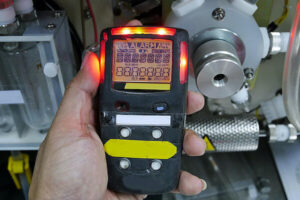There are several techniques for Gas Leak Detection. Some people use a sensor, while others use a probe to detect the presence of gas. Either way, you need to use the proper techniques. Listed below are some techniques for gas leak detection. Use caution when detecting a gas leak, and you should use proper safety equipment and training to avoid accidents. Contact a professional gas leak detection.

Detecting a gas leak with a sensor
The most obvious sign of a gas leak is a smell. While most gases are odorless and colorless, some combustible gases like natural gas have an unpleasant odor. Mercaptan, a substance that gives natural gas its distinct odor, is present in the leaking gas. This smell is reminiscent of rotten eggs or sulfur. In the case of a gas leak, the smell can indicate a more serious problem.
While natural gas is the cleanest and safest fossil fuel, it is extremely dangerous if not detected and is a potential fire hazard. It can displace oxygen and lead to death if not quickly detected. New technologies are helping protect workplaces from the dangers of natural gas leaks. One such device is the Amprobe Gas Leak Detector, which has five distinct LED lights that display gas levels in parts per million. As you get closer to the source of the leak, the gas level will increase.
Detecting a gas leak with a probe
Detecting a gas leak with uei test instruments is a great way to ensure safety in your home. This product has a very accurate detection system and comes with a 18-inch gooseneck, LED light on the probe end, and an audible alarm. While other products have a headphone jack, uei is very precise and can accurately detect leaks in even the smallest spaces.
To use a gas spay probe to detect a leak, the user directs a fine helium beam to the leak. Helium is then pumped to the mass spectrometer, where it is rapidly displayed on a leak rate meter. Because of its low atomic mass, helium is a perfect leak detector as it does not react with other substances in the system.
Detecting a gas leak with a liquid
Detecting a gas leak with squeezing a small amount of liquid dish soap into the gas line will give you an idea of the size of the leak. Gas is colorless and odorless, but a natural gas leak could be hazardous to your health. The odor of mercaptan is similar to that of sulfur or rotten eggs. If you smell this gas, then there is likely a leak.
You should always hire a professional to fix any gas leak, because even a small one could lead to an explosion or fire. A well-placed gas leak detector will allow you to monitor this silent killer. You should test the repairs you made before leaving the area. If you detect a leak, replace the gas line covers. Using this technique is highly recommended. Do not attempt to repair the leak yourself unless you have a licensed plumber.
Techniques for detecting a gas leak
Detecting a gas leak can be tricky. If you can smell the gas, you’re probably not in the clear, but you can try these techniques to find the source of the leak. Gas leaks can be hazardous, so always evacuate the house immediately, and keep windows and doors open. If you suspect a leak, it’s best to contact a licensed plumber to assess the situation. However, if you have no experience with gas detection equipment, you can try checking for bubbles in pipes and looking for smell.
The most obvious sign of a gas leak is the smell. Natural gas has a distinctive odor that the five senses can detect. If you notice a sulfur smell, you’ve probably discovered a gas leak. You can also check your gas bill. If the amount you’re paying for gas bills is consistent and predictable each month, there may be a leak somewhere in your house. If you notice the amount is fluctuating, call a plumber immediately.